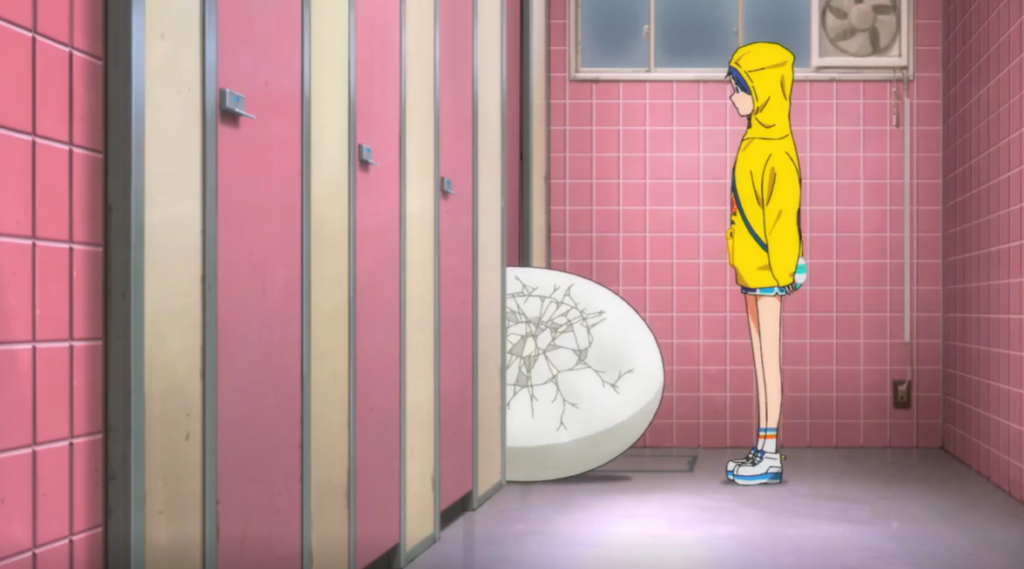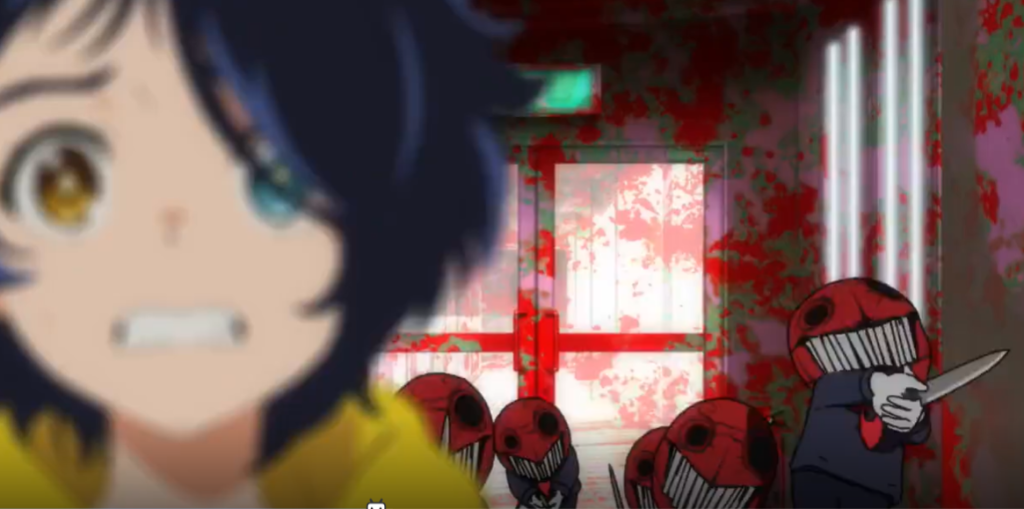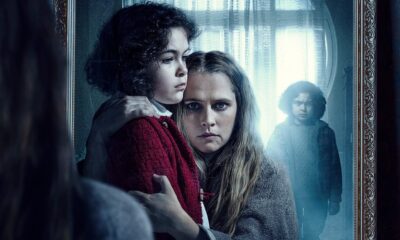
Anime Review of Wonder Egg Priority
I’ve always wanted to do an anime review of Wonder Egg Priority and now that this anime is celebrating its one-year anniversary, this is the perfect time! Wonder Egg Priority is a thirteen episode series defined as a psychological horror / drama. And there’s some real emphasis on the psychological aspect of that.
It follows four girls coaxed into purchasing “Wonder Eggs” from a capsule machine, at the behest of two mannequin-esque men. This egg will grant you whatever you wish. And the first one’s free! … But nothing costs more than a free gift.
“Nothing costs more than a free gift.”
These eggs hatch while the girls are dreaming, turning into the the spirits of young girls who’ve committed suicide. And these ghost girls don’t come alone. The trauma that caused them to commit suicide follows them, manifesting as something monstrous. Our protagonists are tasked with protecting these dead girls by defeating their traumas, using ridiculously oversized magical girl weapons.

The premise is utterly surreal. But it works. It’s the mash up of Persona 5 and Madoka Magica that you didn’t know you wanted.
But Wonder Egg Priority paves new ground by dissecting the unique, and often isolating, suffering that comes from being an adolescent girl. The cause of that suffering is often shown to be the adults around the egg-born victims. Adults who either were the outright perpetrator or silent enablers, and how that power dynamic lead so many girls to suicide.
While you don’t need to be a girl to understand, or have experienced, the things that these girls go through… it is spoken through a very gendered lens. But after watching some utterly garbage female representation, Wonder Egg Priority was deeply refreshing.
Cinematic
Wonder Egg Priority provides gorgeous visuals and action sequences, blended together with bright colors and dazzling music, despite the bleak subject matter. The animation is at moments dream-like and sometimes hyper-realistic. This back and forth between dream and reality is intentional and often seamless, sometimes leaving you questioning which is which.

Characters
The characters are where Wonder Egg Priority truly shines. We follow four girls, each of which have endured deep trauma that have lead them to their own flirtations with self-destruction. They each have someone in their life that has committed suicide, who they’re desperate to have back.
Each character is unique and likely relatable to someone. Ai, a shut-in who was relentlessly bullied. Rika, a girl suffering through deep negligence at home. Momoe, who struggles with her gender identity. And Neiru, an emotionally detached girl who wants to feel human.
Each of them deal with their trauma in their own ways. From hiding away from the world to lashing out at those who love them.
Over the course of the series, their friendships with each other help heal some of the trauma they’ve been carrying and they develop healthier methods of coping with their own (ongoing) struggles. They also meet the Four Temperament Ensemble trope, which is neat.
Story
So, here’s where Wonder Egg Priority becomes a little… infamous. The first half of the series is impeccable! It’s so easy to devour the first half of the series in one sitting. Which I did.
Wonder Egg Priority is more character-driven than plot-driven… for at least the first six episodes. And it works perfectly, melding character and action. And then it hits its (SPOILER) sci-fi moment (/SPOILER). By episode 7/8, Wonder Egg Priority starts its suicide spiral. Tasteless pun intended.
Until the last quarter of the anime, Wonder Egg Priority has laid so many interesting moments of world-building, so many mysteries. I was invested, despite the sudden-left turn, believing fully that the development team would make it work.
But it’s clear that this is a series that was meant for two seasons but was hastily reduced to one. An issue they attempted to solve with an extra-long episode tacked onto the end, which wasted half its time with a 20 minute long run down of previous events.
The ending is all over the place. It’s universally regarded as terrible. There wasn’t enough buildup for it to make sense, and it fizzles into what can only be described as a lackluster pile of strings. Some of them are tied up, sure. But most aren’t.
Unfortunately, it’s unlikely that Wonder Egg Priority will get a second season, though it’s left us with so many questions.
But what’s far, far worse is that the strong message of the first few episodes (learning to deal with trauma and loss) was completely abandoned. (SPOILERSPOILERSPOILER) Wonder Egg Priority spends so much time contemplating the pain young girls go through because of the failure (or sadism) of adults in their life… only to end with two adult men trying to kill a young girl. And then manipulating the four protagonists through deeply traumatizing trials as a last-ditch attempt to kill this girl, when their own efforts fail. Way to kill your own socially relevant message with some random, vaguely incestuous nonsense. (/SPOILERSPOILERSPOILER)

Final Thoughts
Despite the extremely questionable last few episodes, Wonder Egg Priority is still worth the 320 minutes~ it takes to finish. It’s a great ride with a rough conclusion, but that doesn’t mean the journey wasn’t worth it.
Anime Review of Wonder Egg Priority Rating:
4/5
(trigger warning: sexual assault, references to self-harm, images of healed self-harm scars, multiple references to suicide, references to grooming and underaged relationships.)
Movies n TV
Wheel of Time A Question of Crimson Is a Political Espionage Delight
Episode two of Wheel of Time felt like the beginning of a long journey. Stories are unfolding, lives are changing, and blood is spilling.
Let’s discuss.
The story
We begin this episode in the past with Elayne’s mother, Queen Morgase. It turns out her rise to the throne was a bit, shall we say, cutthroat. So when she shows up at the White Tower, Siuan is concerned.
She might have reason to be, too.
Meanwhile, Rand, Egwene, Moiraine, Lan and Aviendha are in the Spine of The World. As they travel through some of the most breathtaking lands I have ever seen on a TV show, Egwene is plagued with nightmares. We think at first that’s just her trauma working itself through her system. But we soon find out that it might not be that straightforward.
Finally, Perrin returns home to heal after his hand is almost cut in half. But when he gets there he finds the town has been infested by Children of The Light. And they’re looking for him.
What worked
There was something heartwarming in this episode about political espionage and choking religious persecution. And that is Elayne’s relationship with her family.
I have consumed a lot of fantasy content with royal families. And I have never once heard a princess call her mother ‘Mum’. I’ve never seen royal siblings get along. And I have sure as hell never seen a princess have a good relationship with her step-parent.
This was refreshing. Even though Queen Morgase is kind of a horrible person she seems like a good mother. And that’s an unexpected delight.

Of course, this is just one storyline among many. And while this can sometimes be overwhelming, in this case it wasn’t.
I’ll be honest, some of these storylines are going to drag for me. I know this because I’ve read some of the Wheel of Time books and I have an idea that not all the characters exactly pique my interest.
No one likes all the characters. No one likes all the storylines. While I am here for the political espionage between Queen Morgase and Siuan, not everyone likes it. While others might be fascinated with Selene trying to win Rand back, I couldn’t care less.
Having multiple storylines keeps everyone’s attention better. So long as things don’t get out of hand. Things can easily get out of hand. But this seems to be managed well.
So far.
What didn’t work
As I mentioned above, I’m not thrilled with Rand’s story at this point. And while it’s fine to not like a storyline when there are this many to choose from, it’s not fantastic that the one I like the least is the one involving our two main characters. And anytime we were with the team at the Spine of The World, the only thing that brought me joy was Moirain’s hat. It reminded me of Stockard Channing’s hat in Practical Magic.
The problem is that Rand is Charlie Brown with controversial magical powers. He is boring, serious, and pessimistic.
And yes, I understand that he has a heavy emotional burden and he’s the Dragon Reborn and that’s quite taxing and all. But let’s be fair, there isn’t a single person in this show that doesn’t have a heavy burden. And most of them manage to be fun occasionally.

All that being said, this episode of Wheel of Time did exactly what it needed to do. It set up conflicts at each of the three locations. It established emotional ties between the characters and the events. And it established goals for everyone.
This was, in short, a solid episode. Not groundbreaking, not mind-blowing or life changing. It was simply good. It was entertaining and moved the plot forward.
Well done.
 (3.5 / 5)
(3.5 / 5)
Movies n TV
Wheel of Time Returns With A Bang
Wheel of Time is back for season three. There are mixed feelings regarding this. Last season, there were some serious pacing issues. And some serious sticking to the book’s storyline issues. But we’re two seasons in, and we don’t give up so easily. So let’s dive into episode one, To Race the Shadow.
By the way, I highly recommend watching this episode with the subtitles on. You’ll see why.
The story
We begin this episode with Liandrin facing a trial of sorts for her rampant betrayal. She does her best to gaslight her Aes Sedai sisters into thinking that Siuan Sanche is the real traitor.

When that doesn’t work, she reveals how many Black Aes Sedai have actually infiltrated the tower.
Spoiler, it’s a lot.
In the aftermath, our whole team gathers to drink and enjoy one night of relaxation before they head out to the Tear to form an army for Rand. All is going well until they’re attacked by myriad creatures and a sentient axe.
What worked
This episode was long. It had a run time of an hour and eleven minutes. And a lot of that run time was spent in heavy dialog scenes.
Fortunately, these were well-done scenes.
If you’re going to have a lot of talking scenes, there are good ways and bad ways to do it. Last season, we saw lots of examples of the bad way to do it. But this episode did it well. For one thing, other things were going on while conversations were taking place. The characters are drinking, playing games, walking through an interesting city. And the scenes themselves didn’t stretch out. They weren’t repetitive. We heard what the character had to say, then we moved on.
It was also nice that the point of these scenes wasn’t just info dumps. We had character development. We had romantic interactions. We had plot development and foreshadowing.
Overall, this episode felt like what it was. A moment of calm before a storm.
Taking a step back, I’d be remiss if I didn’t address the fight scene at the start of the episode. Because it was epic.
The magic looked amazing. The martial arts that went along with it looked fantastic. The costumes were beautiful. It was just incredibly fun to watch.
More than that, it was emotional. We lost some characters in that fight that were important. And it was clearly emotionally shattering for many of our characters, who found themselves betrayed by people they trusted.
So many of them.
It was a great way to open the season.
What didn’t work
Despite that, this episode wasn’t without its flaws.
First off, there were a lot of dialog scenes. And they were good scenes, as I’ve already discussed. But it was one after another after another. And when your episode is, again, an hour and eleven minutes, it’s maybe a little much to have so much chit-chat. Couldn’t some of these conversations, important as they were, have been moved to maybe another episode?
Finally, I want to talk about Egwene’s travel through the arches.

I feel like maybe there were some deleted scenes here. Because there must have been more to that visit than what we saw, right?
We could have seen Egwene battle Rand. That would have been badass and emotionally devastating. We could have seen her with a quiet life with Rand back home at the Two Rivers. We could have seen anything except for the quick clip of Rand in a bloody river, followed by Egwene being shoved back out in a bloody shift.
Bad job. But at least it wasn’t an extended scene of Moiraine collecting bathwater, and then taking a bath while looking sad. If we’d started this season with another scene like that, it might have broken my brain.
Amazon dropped the first three episodes at once. So we’ll be back soon to talk about episode two. See you then.
 (4 / 5)
(4 / 5)
Movies n TV
Entertaining as hell: Eight Legged Freaks (2002) Review
Early 2000s is a special era for the industry. It accepts the cheesiness and corniness of movie making, in turn producing some gems in their own right. Eight Legged Freaks starring David Arquette and young Scarlet Johanson is a horror comedy about giant spiders who overtake a small town. As crazy as that premise sounds, the movie surprisingly has a ton of heart and is super entertaining. Let’s review, shall we?
Plot
We start Eight Legged Freaks with a shot of toxic waste spilling into the water supply of Joshua, a spider farm owner. He is friends with Mike, one of our protagonists, who is a science geek and a spider enthusiast. Mike notices something quite right upon visiting Joshua, but no one takes him seriously. We are then introduced to the rest of the crew. Mike’s mother Samantha, the town sheriff, is too busy chasing Ashley, his sister, who is dating the town mayor’s son Bret (something Samantha does not approve of). We also have Chris, who returns to the town to save his father’s legacy in the town mines. He has opposition from Wade, Bret’s father, who wants to use the mines for his business ventures. Lots of drama going on that will only get juicier once the spiders get loose.
The creepy crawlies quickly dispose of Joshua and make their grand appearance after Ashley rejects Bret’s advances, abandoning him in the middle of a desert. A glorious chase sequence ensues as the spiders make their way towards the town, wreaking havoc on its residents. In a true horror fashion (which the movie acknowledges), it takes some convincing from Mike and then from Samantha for the town to take the threat seriously. The tongue-in-cheek style of narrative adds the comedy aspect to a movie that would otherwise burn out fairly quickly.
The remaining characters hide out in a shopping mall as it’s the only somewhat sturdy building in the area. This doesn’t last long as the spiders break in, forcing them to run through the mines. Their resources to fight the creepy crawlies off are limited as the methane gas doesn’t allow them to use firearms. Such conditions require resourceful thinking from Chris, who uses perfume to fend off the leader of the spider group and save himself during the climax of the movie.
Character dynamics are not forgotten once the action kicks in. We have Chris confessing his long-term feelings for Samantha which she knew all along, which provided some comedic relief. Bret also reunites with Ashley and apologises for being an asshole. Mike finally gets the appreciation he deserves as his knowledge saves the townsfolk more than once during the whole ordeal.
We end the movie with the town’s radio show person telling the story as an urban legend during his segment. This brings it into question – how much of it happened the way he said it did? We can only guess…
Overall thoughts
Eight Legged Freaks is a fun creature feature with some self-aware commentary on genre tropes that doesn’t take itself too seriously. The acting is good, the pacing fitting and the characters are likeable enough for you to want them to make it through. Definitely a must watch, if you don’t suffer from arachnophobia, that is.
 (5 / 5)
(5 / 5)














Jennifer Weigel
June 28, 2022 at 10:22 am
Great review. I shall definitely add this to my watch list. This is why I wanted to watch the film Hatching. It also touches on some of the difficulties of being an adolescent girl, growing up, and the expectations that come with it. I am sorry the ending was rushed and didn’t continue on the same trajectory as it started after it seemed the show wouldn’t make it to a second season, that is truly unfortunate and a step backwards from where they started.